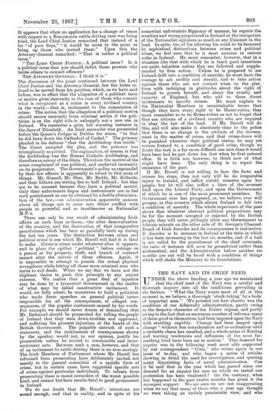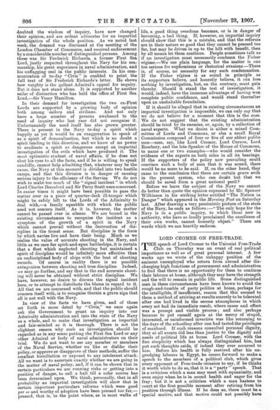THE NAVY AND ITS CHIEF NEED. -U NDER the above heading
a year ago we maintained that the chief need of the Navy was a careful and thorough inquiry into all the conditions prevailing in the Service. " What the Navy wants most of all at this moment is, we believe, a thorough 'stock-taking' by a body of impartial men." We pointed out how chaotic was the condition of our Admiralty administration, partly owing to the despotic character of the Fisher regime, and partly owing to the fact that an enormous number of reforms, many of them good in themselves, had been imposed upon the Navy with startling rapidity. Change had been heaped upon change " without due consideration and co-ordination until a veritable chaos has resulted, and a whole series of floating and warring tendencies and influences of the most far- reaching kind have been set in motion." This demand for inquiry was in the following week most ably supported by our correspondent " Civis," who writes again in our issue of to-day, and who began a, series of articles showing in detail the need for investigation, and quoting many disquieting facts of naval administration. Can it be said that in the year which has passed since our demand for an inquiry the case on which we rested our contention has been weakened ? On the contrary, what has happened in the past twelve months has given it the strongest support. We are sure we are not exaggerating when we say that many of those who a year ago thought we were taking an unduly pessimistic view, and who doubted the wisdom of inquiry, have now changed their opinion, and are ardent advocates for an impartial investigation of the whole position. As we noted last week, the demand was discussed at the meeting of the London Chamber of Commerce, and received endorsement by a considerable number of distinguished persons. Among these was Sir Frederick Richards, a former First Sea Lord, justly respected throughout the Navy for his sea- manship, his great experience in naval administration, and his unflagging zeal in the public interests. In his com- munication of to-day " Civis " is enabled to print the full text of Sir Frederick Richards's letter. He shows how weighty is the gallant Admiral's appeal for inquiry. But it does not stand alone. It is supported by another sailor of distinction who has held the office of First Sea Lord,—Sir Vesey Hamilton.
In their demand for investigation the two ex-First Lords are supported by a growing body of opinion both among sailors and civilians. And not only have a large number of persons awakened to the need of inquiry who last year did not recognise it. Unfortunately the need itself has also grown greater. There is present in the Navy to-day a spirit which happily as yet it would be an exaggeration to speak of as a spirit of demoralisation, but which is no doubt a spirit tending in this direction, and we know of no power to eradicate a spirit so dangerous except an impartial investigation of the evils which have produced it. The most optimistic student of naval affairs, if he does not shut his eyes to all the facts, and if he is willing to speak candidly, cannot help admitting that, whatever may be the cause, the Navy at this moment is divided into two hostile camps, and that this division is in danger of causing serious injury to the efficiency of the Service. We do not wish to make too much of the " signal incident " in which Lord Charles Beresford and Sir Percy Scott were concerned. In easier times it might have been possible to pass the matter over as a piece of quarter-deck ill-temper which might be safely left to the Lords of the Admiralty to deal with,—a family squabble with which the public need not concern itself. As it is, however, the matter cannot be passed over in silence. We are bound in the existing circumstances to recognise the incident as a symptom of the growth of a spirit in the Navy which cannot prevail without the destruction of dis- cipline in the truest sense. But discipline is the force by which navies live and have their being. Much as we realise the value of accurate shooting in the Navy, and little as we care for spick-and-span battleships, it is certain that a fleet which neglected shooting but maintained a spirit of discipline would be infinitely more effective than an undisciplined body of ships with the best of shooting records. Of course in reality there is no possible antagonism between shooting and true discipline. Indeed, we may go further, and say that in the end accurate shoot- ing will never be obtained without strict discipline. We have, however, no desire to discuss the signal incident here, or to attempt to distribute the blame in regard to it. All that we are concerned with, and that the public should concern itself with, is to recognise therein a grave sign that all is not well with the Navy.
In view of the facts we have given, and of those set forth in more detail by " we once again ask the Government to grant an inquiry into our Admiralty administration and into the state of the Navy as a whole, and to make that investigation as impartial and fair-minded as it is thorough. There is not the slightest reason why such an investigation should be regarded as in any sense putting the First Sea Lord or any other Admiral or body of naval administrators on their trial. We do not want to see any member or members of the Naval Service, whether we like or dislike their policy, or approve or disapprove of their methods, suffer the smallest humiliation or exposed to any intolerant attack. All we want is to ascertain exactly whither we are going in the matter of naval policy, and, if it can be shown that in certain particulars we are running risks or getting into a posititon of danger, to call a halt till a safer course has been determined upon. We think, personally, that in all probability an impartial investigation will show that in certain important particulars reforms which were good per se and worthy of adoption have been pressed too far,— pressed, that is, to the point when), as in most walks of life, a good thing overdone becomes, or is in danger of becoming, a bad thing. If, however, an impartial inquiry should show that this is a mistake, and that the reforms are in their nature so good that they cannot be pressed too far, but may be driven in up to the hilt with benefit, then by all means let them continue. People sometimes talk as if an investigation must necessarily condemn the Fisher regime.—We use plain language, for the matter is one too serious for euphemisms or rhetorical evasions.—There is, of course, no necessity for any such condemnation. If the Fisher regime is as sound in principle as its supporters believe, and honestly believe, it can lose nothing by investigation, but, on the contrary, must gain thereby. Should it stand the test of investigation, it would, indeed, have the immense advantage of having won complete public confidence, and would stand thereafter upon an unshakable foundation.
If it should be alleged that in existing circumstances an impartial investigation is impossible, we can only say that we do not believe for a moment that this is the case. We do not suggest that the existing administration should be tried by its enemies, or, again, by a collection of naval experts. What we desire is either a mixed Com- mittee of Lords and Commons, or else a small Royal Commission composed of four or five of our ablest public men—men, say, like Lord Cromer, Lord Curzon, Lord Rosebery, and the late Speaker of the House of Commons, to name one or two examples—who would consider the evidence of the experts on both sides in all its bearings. If the supporters of the policy now prevailing could convince such a body of men that it was sound, there would be no more to be said. If, on the other hand, they came to the conclusion that there are certain grave evils in the present system, who can doubt but that we should be saved from a great national peril ?
Before we leave the subject of the Navy we cannot do better than quote the opinion expressed by Mr. Spenser Wilkinson in his striking letter entitled " The Nation in Danger" which appeared in the Morning Post on Saturday last. After drawing a very pessimistic picture of the state of the Navy, he ends as follows :—" The only hope for the Navy is in a public inquiry, to which those now in authority, who have so loudly proclaimed the excellence of their own works, cannot honestly object." These are words which we can heartily endorse.



















































 Previous page
Previous page